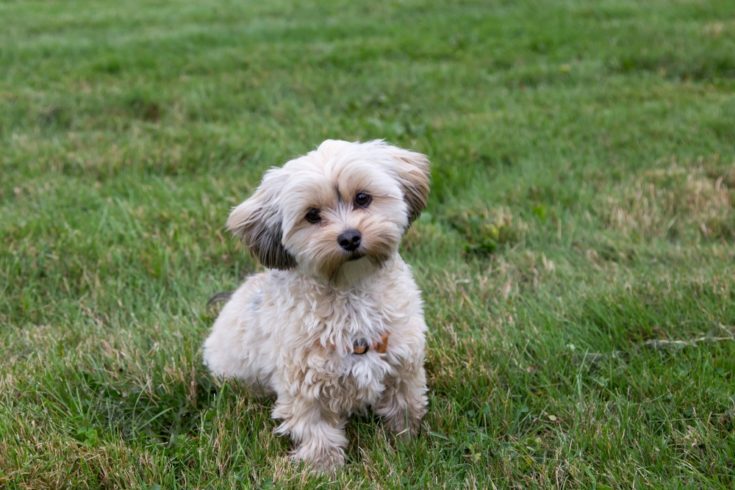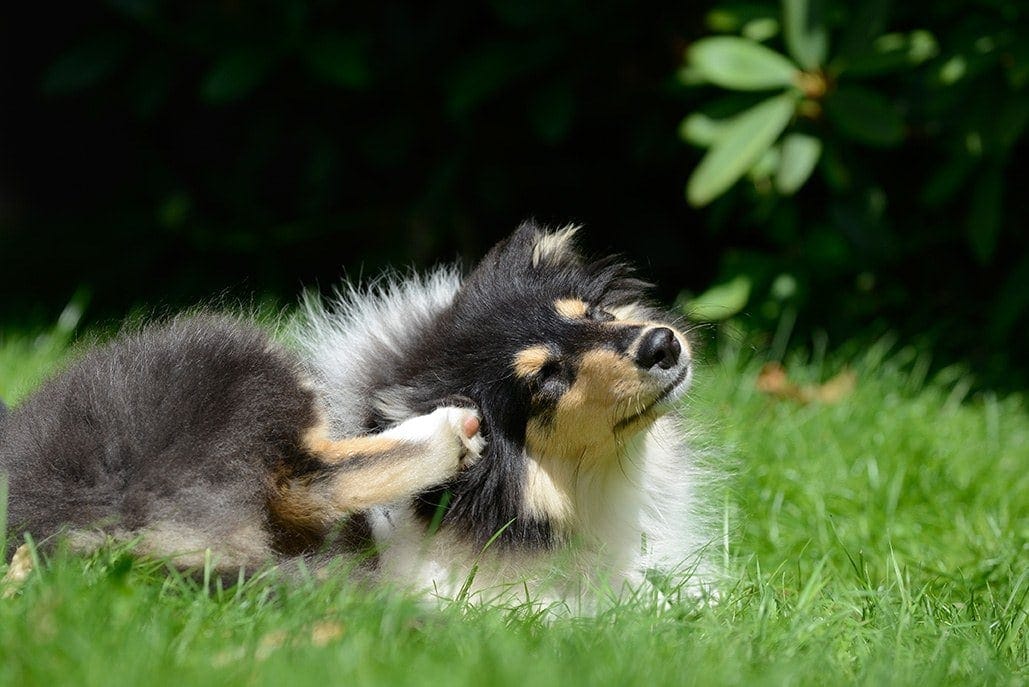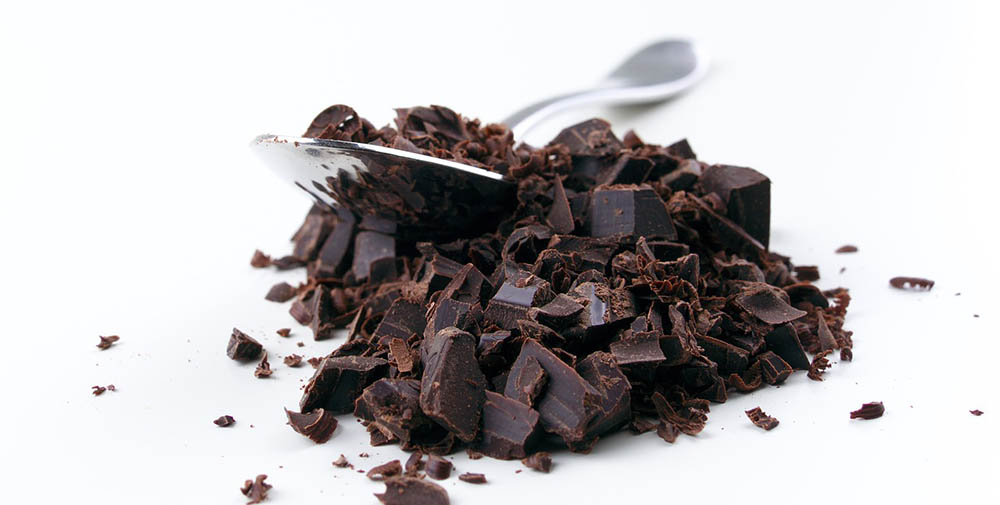Height:
9-12 inches
Weight:
9-13 pounds
Lifespan:
10-13 years
Colors:
White, black, brown, tan
Suitable for:
Singles, retirees, families with older children, those looking for companionship
Temperament:
Intelligent, Playful, Energetic, Gentle, Occasionally stubborn
The Morkie is a hybrid dog breed from the Maltese and the Yorkshire Terrier parent breeds. They are small dogs but have a lot of character, tending towards a playful and attentive nature. They can live equally happily in apartments or homes with large yards, do not have high exercise requirements, but they can prove to be a little yappy. They are also quite demanding of your attention, as they do make excellent companion dogs.
Although this Maltese Yorkie mix does not require a lot of daily exercise, they can become destructive if they get no exercise, so a short daily walk should be considered an essential part of their ownership. Despite their playfulness, the Morkie is quite a fragile dog, which means that they may not be suitable for families with very small or young children.
If you are looking for a playful little dog who requires minimal exercise and can adapt to life in an apartment or a large house, the Morkie could be your ideal companion. On the other hand, if you’re looking for a dog that will enjoy some rough and tumble with the kids and you want a companion for long and grueling walks, you should look to other breeds that are better suited to this type of lifestyle.
Morkie Puppies – Before You Buy…

What’s the Price of Morkie Puppies?
The size and temperament of the Morkie makes them a popular dog. For example, they are popular with elderly dog owners because they do not require a lot of exercise. They are also popular with families with older children because the Morkie is a playful and happy puppy. This popularity means that there are plenty of breeders specializing in this breed, but it also means that you will have to pay more for a puppy of this type. Expect to pay anywhere between $1,000 and $2,000, with even higher prices for prize examples of the breed.
Finding a good breeder means finding one with a strong reputation for breeding healthy and alert dogs. Before agreeing to take any puppy, arrange to meet the breeder themselves. Have a look at the location where the dogs are bred and live and try to meet the parents. The mother dog is the one that is generally available for meetings, and this can give you a reasonable indication of the size, appearance, and the emotional and mental attributes that your puppy will possess. With that said, your dog’s mental wellbeing is governed by you.
If you do buy a puppy from a breeder, ask to see screening certificates, arrange for at least one meeting with the puppy, and if you are being offered a deal that seems too good to be true, remember that there is likely to be a reason behind this. Demand for this type of dog is high, so if a breeder is charging you less than the market rate, it means that they have some need to get rid of them quickly.
The popularity of this breed does, unfortunately, mean that a lot of Morkie puppies end up in rescues, especially as they get older. When taking any rescue dog, you should meet them before you agree to adopt. This will give you the opportunity to assess the dog for physical illnesses and physical conditions, as well as to determine their friendliness, responsiveness, and whether they are especially yappy.
3 Little-Known Facts About Morkies
1. Maltese are prone to sunburn.
The Maltese breed is very prone to sunburn for a number of reasons. White hair does not offer much in the way of protection against the sun’s rays, while the breed’s parted hair means that their skin is exposed to direct sunlight for much of the time they are outdoors. Furthermore, dogs with hair, rather than fur, are more likely to get sunburned because it doesn’t offer as much barrier protection against UV rays. Finally, the sun can reflect up off surfaces, leading to a sunburned belly, and because there is very little hair around the nose, this is another area that is prone to getting burned.
Sunburn not only leads to flaky and itchy skin, as well as skin discoloration, but it can also cause the hair to burn and become badly damaged, and squamous cell carcinoma is a slow-growing but aggressive cancer that is known to be caused by overexposure to the sun.
Buy and apply sunscreen, limit the amount of time your dog is out in the high sun, and always ensure that your Morkie has plenty of water to drink in the summer months.
Yorkshire Terriers suffer some of the same problems: they have hair rather than fur, little covering around their noses, and they are close to the ground so are prone to reflective heat. Their only saving grace is the color of their coat because the dark brown and black coat does offer some protection from the suns’ rays.
Your Morkie, regardless of hair color, will require your help to ensure that they don’t suffer the negative effects of sunburn.
2. The Morkie makes a great family pet.
The Morkie is considered an incredible family pet. They will get along with people of all ages and can be integrated into homes with other dogs as well as cats, although the level of success depends on the individual dog.
They are bright and playful, which means that they are good with children and can be taught to behave how you want them to. You should take care with such small dogs around children because kids have a tendency to be a bit grabby, which can cause pain and may even lead to your dog snapping at your child. Other than this, though, if you are looking for the perfect family pet, then the combination of Maltese and Yorkshire Terrier could prove to be the best addition to your home.
3. The Yorkie is a toy breed.
The Yorkshire Terrier comes from Yorkshire, a county in England, although it was bred using Scottish blood. They made the journey from England to the USA in the 19th century, when it is believed that millworkers brought them over. Little is known of their exact journey because, according to historians, the men that brought them over would have been poorly educated and unlikely to be able to write. They were used for catching rats and other vermin, but also for companionship.
Despite this heritage, and because the Yorkshire Terrier is one of the smallest breeds in the world, it is often classified as being a toy dog breed.
Toy breeds are those that have been bred down in size so that they are easier to hold and more comfortable to sit on their owner’s lap. Although no giant, the Maltese is expected to grow marginally taller than the Yorkie, but only by an inch or so. The mixing of these two miniature breeds means that you could have a tiny little terrier on your hands, but this doesn’t mean that he won’t have a giant character.

Temperament & Intelligence of the Morkie
The Morkie is a beautiful dog bred for companionship. He will be very loyal and loving, often shadowing his owner at all times of day and night. If you do decide to purchase one, you will likely have to get used to checking behind you to ensure that you don’t stand on him. This is one breed that tends to suffer from “small dog syndrome.” They might be tiny, but they don’t know that. They will yap at bigger dogs, often wanting to play with them. In fact, they will yap at most things. Their size means that they do not make good guard dogs, but they are goof watchdogs because they will alert their family members to any new person or new sight that they encounter.
Are These Dogs Good for Families?
The Morkie is good with adults and older children. In fact, they will get along with people of all ages and sizes, but they may be wary of young children, especially if they have had their ears or tail pulled by infants before. If you do have very young children, you should supervise the time that your child and dog spend together and ensure that the child doesn’t grab any part of the dog. In most cases, this tiny breed is better with older children that have a good understanding of how to safely and calmly play with little dogs.
They do tend to latch onto a single person in the household and become their shadow. As such, they will flourish in a one-on-one situation, so they are an excellent choice of pet for seniors and singles.
Does This Breed Get Along with Other Pets?
The Morkie is a companion dog. He will bond closely with his owner and, as such, he might not like any other dogs or other pets getting the attention that he believes should be for him. This jealousy can manifest itself in the usual Morkie fashion — yapping. In extreme circumstances, though, yapping can lead to snapping. It is also worth noting that Morkies are not bigger than a small cat, and if the cat rules the house, which is typical in a lot of households, your Morkie may come worse off with a scratched nose or eyes.
Despite their size, though, the Morkie is a ratter. He has been bred to chase very small animals, which means that any small pets you have may be at risk if your Morkie retains his high prey drive. If you have guinea pigs, hamsters, or any other small pet, ensure that you supervise any time when they are out of the cage so you can be sure that all of your animals are kept safe.
Things to Know When Owning a Morkie
The Morkie is a highly desirable pup thanks primarily to his playful and energetic character. While he might not be best suited to families with very small children, he makes an exceptional companion to singles and, because of his minimal exercise requirements, to seniors. With that said, there are certain factors you have to consider before welcoming a Morkie into your home.
Food & Diet Requirements
The Morkie is considered a small dog with medium to high energy requirements. They also tend to have voracious appetites and will happily gorge on kibble. This means that you need to feed them diligently, providing the right amount and only feeding them at mealtimes. Their size means that it is very easy to overfeed them, especially when it comes to giving them treats. Expect to feed your dog between ¾ of a cup and one cup of good quality kibble over the course of a day, depending on their age and size. If you use treats for training, ensure that these are healthy and have minimal calories, and that you take this off their daily feeding allowance. Because of a Morkie’s tendency to eat anything in front of him, avoid leaving food down between meals, and offer two meals a day at set times.
As with all breeds, you should tailor the feeding to the age of the dog, too. Puppies require more protein because it helps their muscles develop, while senior dogs will require less protein and fewer calories because they will be less likely to burn off any excess.
Exercise
Morkies are energetic little dogs, but the emphasis is on the word little. They require exercise every day, but this should be limited to a walk of around 30 minutes. Any more than this and you could actually cause injury or illness, but any less than this and your dog may become bored and destructive when in the house.
Morkies are natural terriers, which means that they have energy to burn. They can do very well at agility, when they will get to show off their incredible jumping prowess, as well as their boundless energy levels.

Training
Morkies, like any terrier and terrier crossbreed, can be a little stubborn. They do want to please their owners, but only if what pleases you also pleases them. With that said, they are intelligent and generally happy dogs, so as long as you can avoid the stubborn streak, they will be easy to train. This is especially true if you use a treat-based training program.
Grooming ✂️
Morkies are considered low-shedding dogs. This sounds like easy maintenance because it means there will be less hair to sweep up and clean off clothes. In reality, though, it means that your dog’s hair will need more frequent and more attentive grooming. Expect to groom your little one’s hair every day. This will remove loose hair and prevent your dog’s coat from becoming matted and knotted. Their hair can also grow several inches in next to no time, and this can be especially troublesome around areas like the eyes. Have their hair trimmed every couple of months to ensure that they can see where they’re going when they’re charging around.
Dental hygiene is especially important in small dog breeds, although it should be considered essential to all breeds. Small dogs are more prone to dental problems, and you should gently brush your dog’s teeth at least twice a week. If he will let you (some dogs actually like it), you should look to brush their teeth daily. Start brushing your dog’s teeth when they are a young puppy because this will help you get into a routine and it should teach your dog that tooth brushing is nothing to be afraid of.
You will also need to keep your dog’s claws clipped. If a dog’s claws get too long, it can be painful for them to walk. If you can hear your Morkie’s claws when they walk on wood and laminate floors, it is time to clip them. This may occur as often as every month or two. If they regularly walk on concrete, it may be longer before you have to get the clippers out again.
Health Conditions
Teacup Morkies are more prone to certain conditions, primarily due to their tiny size and the breeding that has led to this toy stature. With that said, all Morkies are prone to certain conditions. As well as dental problems that are evident in dogs of this size, you should look for signs of the following conditions and get them treated as soon as possible.
- Hernias
- Flaky skin
- Collapsing trachea
- Glaucoma
- Hypoglycemia
Male vs Female
As is common in most dog breeds, the male Morkie is likely to grow a little taller and heavier than the female. Some owners have also reported that males are more dominant and demanding, while females tend to be more independent, but this is largely dependent on the individual rather than the sex of the dog.
Final Thoughts on the Morkie
The Morkie is a hybrid, designer dog breed, that was created by crossing the Maltese with the Yorkshire Terrier. These are two very popular breeds in themselves, and the resulting crossbreed is equally as popular. They are generally considered to be bright and lively little dogs and are popular with families as well as individuals. Although they are suitable for older children, it is best not to own a dog of this diminutive size when you have very small children.
The Morkie breed can be accused of being yappy, and he will latch on to his owner emotionally. He has moderate exercise requirements that are tempered by his size, and if you can get past the stubborn streak that terriers tend to possess, you should find that your Morkie is a surprisingly easy little dog to train to your standards.
If you have a relatively quiet house and are looking for a little shadow of a dog to follow you around, and you enjoy lavishing attention on your pets, then this breed is the perfect companion for you.
Featured Image Credit: Ursula Page, Shutterstock











